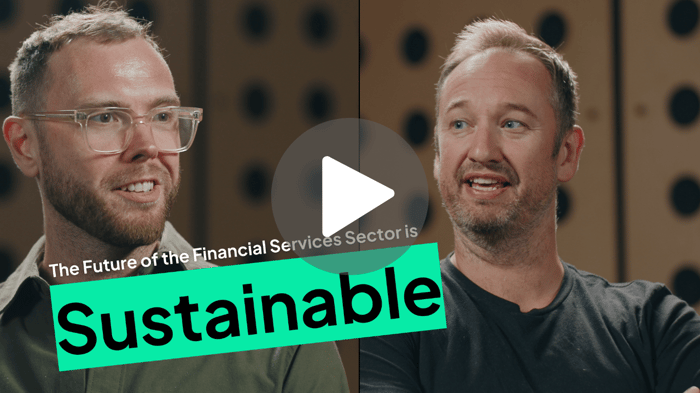The financial services industry is standing at the edge of a pivotal transformation. Amidst economic uncertainty, political shifts, and rising regulatory pressure, one fact has become undeniable: the future of finance lies in sustainability.
This isn't a distant possibility or a utopian ideal—it's already happening. According to a report by the Global Sustainable Investment Alliance, sustainable investment now accounts for over 36% of all assets under management globally, a figure that has risen by more than 15% in the last two years alone. In the UK specifically, sustainable investment has surged 125% since 2020, driven by growing consumer demand and governmental policy. The UK’s financial market is on a clear trajectory toward greener and more responsible investment strategies, yet the path ahead is far from straightforward.
Political influences, including the UK’s commitment to achieving net-zero emissions by 2050, are forcing institutions to rethink how they operate. The Financial Conduct Authority has issued new guidelines that require companies to disclose how their operations affect the environment and society—a mandate that investors, asset managers, and portfolio directors can no longer afford to ignore.
The Political and Economic Shifts Reshaping the Market
Financial services companies are under pressure from all sides. Not only is regulation tightening, but political discourse around green finance is intensifying. The UK government has made sustainability a core pillar of its financial roadmap, emphasising green finance as part of its post-Brexit economic strategy. The rise of the Green Finance Institute and initiatives like the Task Force on Climate-related Financial Disclosure are just the beginning.
But it’s not just regulations and politics pushing this change. In the past decade, the UK has witnessed a growing public and investor appetite for sustainable products. A 2023 survey conducted by UKSIF (UK Sustainable Investment and Finance Association) found that 71% of UK investors now want to see their pension funds divested from environmentally harmful companies. Investors are increasingly focused on mitigating climate risk, which directly affects how funds, asset managers, and financial institutions must make decisions. And it’s not just about keeping investors happy—it’s about securing future profitability.
In the midst of this, the UK financial services market must contend with mounting economic pressures. A volatile global economy, combined with increased costs associated with ESG compliance, has created a new operating environment where financial sustainability is not only a regulatory imperative but a business necessity.
Financial Rewards for Going Green
Contrary to lingering myths, sustainable investing does not come at the cost of returns. Research overwhelmingly shows that businesses which prioritise sustainability factors are seeing stronger financial performance.
A report by BlackRock revealed that companies with strong ESG profiles experienced 18% higher operating margins and 15% lower volatility in 2022.
Moreover, businesses that actively address climate risks are positioning themselves for long-term resilience, with the potential to unlock an estimated $12 trillion in business opportunities linked to sustainable investments by 2030 (UN SDG report).
The evidence is clear: companies that ignore sustainability risk missing out on both financial growth and the chance to future-proof their operations. Financial services institutions need to start viewing sustainability as an integral part of their business strategies—not just a compliance requirement.
The Opportunity: Shifting from Compliance to Strategy
While many firms have begun incorporating sustainability into their decision-making frameworks, a majority are still struggling to get it right. A study by PwC revealed that over 70% of asset managers consider ESG factors in their investment decisions, but only 26% have fully integrated ESG into their risk management processes.
Why the gap? Much of it comes down to access to reliable data. Financial institutions are finding it increasingly difficult to obtain high-quality, actionable sustainability data that can be seamlessly integrated into traditional financial models. This data bottleneck is slowing progress, creating a competitive disadvantage for firms that cannot adapt quickly enough to new standards.
At the same time, sustainability can no longer be a mere 'box-ticking' exercise. Financial services must move beyond the minimum regulatory requirements and embed sustainability into their strategic decision-making processes. Investors and stakeholders are watching closely, and firms that can successfully align their portfolios with sustainability principles will gain a crucial advantage.
A candid conversation: The future of financial services
To dig deeper into these complex dynamics, we invite you to watch our financial services deep dive where our CEO and founder, Dan, and Chief Commercial Officer, Luke, share their raw, unfiltered views on the current state of the financial services market.
In this honest conversation, they discuss how political trends, market shifts, and regulatory pressures are pushing the industry toward a more sustainable future.

The discussion is not just about compliance or avoiding risks. It’s about how financial services can lead the change toward a greener, more profitable future.
With sustainability at the heart of decision-making, companies can not only survive but thrive in this new era.
How can Rio help you?
We empower financial services firms to make smarter, greener decisions, unlocking both financial returns and a more sustainable future.
Our platform enables you to:
- Measure and track your carbon footprint: Get precise insights into the environmental impact of your portfolios.
- Streamline sustainability frameworks and integrations: Easily incorporate sustainability metrics into your traditional financial models, allowing you to enhance performance.
- Ensure regulatory compliance: Stay ahead of evolving regulations and requirements, ensuring your investments are not just sustainable, but compliant.
- Respond to stakeholder demands: Meet growing investor expectations by demonstrating your commitment to sustainability with data-driven insights.
Get started with a complimentary demonstration with our expert consultants today.










